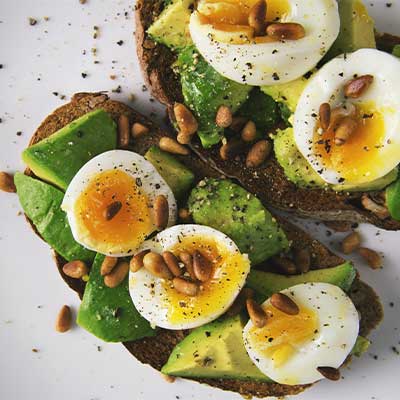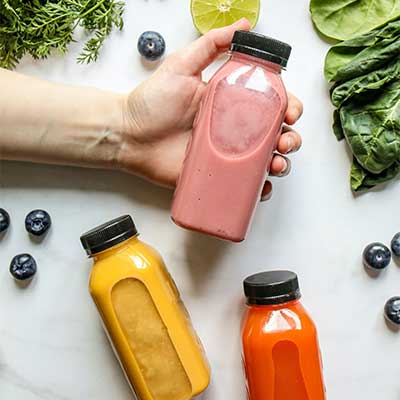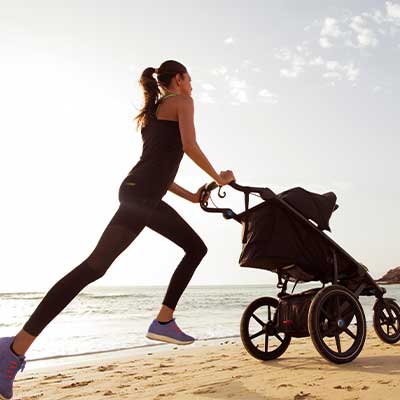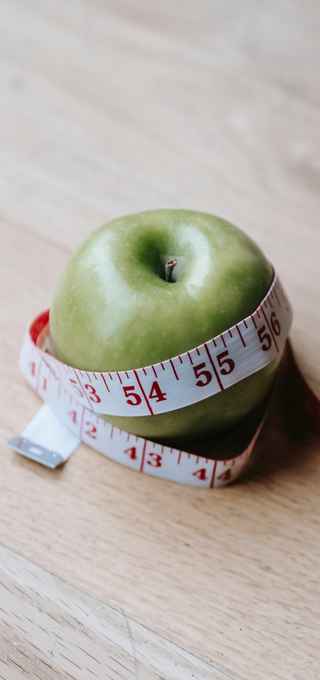Last Updated on July 31, 2024 by Nicole
Want Lose Weight While Still Drinking Alcohol?
One of the fastest ways a person can become overweight is by over-consuming food and/or alcohol. This is mainly because of the uneven balance of energy supplied and demanded in the form of calories.
Although when we’re speaking in terms of alcohol, it’s a little bit more complicated than just calorie counting, I will explain that later. Below, we’ll look into combining our alcohol consumption with weight loss.
How Much Is Too Much
According to the USDA, excessive consumption of alcohol (Women: 4 drinks/day or 8 drinks/week; Men: 5 drinks/day or 15 drinks/week) may have negative short-term and long-term effects (6). Excessive drinking can cause alcoholism, liver disease, pancreatitis, cognitive issues, and cancer. It also plays a major role in weight gain and some cases obesity (5).
However, alcohol is not all bad! Consuming alcohol in moderation can be an enjoyable way to loosen up at social events, wind down after a long week of work, enjoy time with your family and friends, or simply enjoy the experience of trying various kinds of alcohol.
Whatever your reason is, the common misconception is that you must give up everything you love to eat and drink to lose weight. That’s not true. Is it possible to lose weight without having to give up alcohol? Absolutely. We must first, however, acknowledge how alcohol can intrinsically lead to weight gain.
The Link Between Alcohol Metabolism and Weight Gain
To fix the problem of weight gain caused by alcohol consumption, we must understand how our body breaks down alcohol. The chemical name for alcohol is ethanol. There are several steps our body must take to process and eliminate ethanol. Chemicals in our body called enzymes break apart the ethanol molecule into other smaller compounds known as metabolites; these make it easier for the body to process ethanol.
Some of the resulting metabolites from ethanol can have toxic effects on the body. Most of the ethanol is broken down in the liver by an enzyme called alcohol dehydrogenase (ADH), which breaks ethanol down into a compound called acetaldehyde. Acetaldehyde is an extremely toxic substance and a known carcinogen.
Fortunately, acetaldehyde is generally short-lived; it is quickly broken down into a less toxic compound called acetate by another enzyme: aldehyde dehydrogenase (ALDH). Acetate is then broken down, mainly in tissues other than the liver, into carbon dioxide and water (5).
ADH Cycle
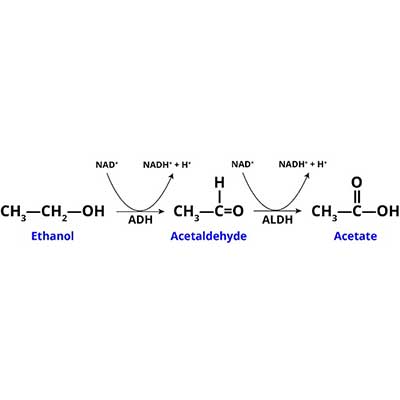
Since ethanol becomes more toxic as it metabolizes, your body wants to get rid of it as quickly and efficiently as possible to stop the damage. This is a great defense mechanism for the body but causes a problem when it comes to weight gain.
As a result, your body will utilize ethanol as its primary energy source before using fats or carbohydrates. This phenomenon causes these extra macronutrients to convert into lipids. Once these lipids are formed, they can accumulate in the liver and lead to a condition known as “fatty liver”. These lipids can also circulate in the bloodstream and accumulate into harmful arterial plaque or convert it into stored fat (7).
Another important step for weight loss is maintaining a slight calorie restriction to elicit a hypocaloric (or “under-calorie”) state. Alcohol is extremely energy dense; it contains 7 calories per gram, which is more than every other macronutrient (carbohydrates and protein contain 4 calories/gram) apart from fat (9 calories/gram). The calories we consume from alcohol are considered “empty” or contain zero nutritional value.
On average, a 12 oz. beer contains 5% alcohol and 98 calories, a 5 oz. a glass of wine contains 12% alcohol and 120 calories, and a 7 oz. rum and cola contain 40% alcohol and 155 calories (6). We also must consider the calories from any added syrups/sweeteners in the alcohol itself, including chasers or mixers that you may add to a cocktail.
Finally, studies have also shown that alcohol inhibits the satiety hormone, leptin (4). This hormone is responsible for telling our brain that we’re full. The result is that we run the risk of overeating if we consume alcohol during a meal or when hunger sets in toward the end of a long night of drinking.
Tips for Drinking for Your Health
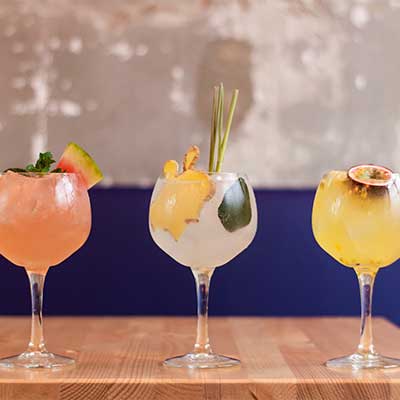
All things considered, if you plan to drink alcohol during a weight loss journey, it must be done in moderation. With that said a few drinks will not completely ruin the progress that has been made toward your goals. There is no reason to completely deprive yourself, especially if you are used to drinking alcohol, regardless of what your fitness goal may be.
Therefore, I’ve included six pragmatic and budget-friendly tips that you can use to be successful in your fitness journey while still enjoying the experience of moderate alcohol consumption. Whether you’re looking to lose weight or just stay in shape, these tips will help across the board:
Choose spirits over beer and liqueur
Most spirits (or liquor) contain very little sugar outside of the fermentation process, while liqueurs are usually sweetened with sugars/syrups. Except for light beer, most regular, craft, or IPA beers also contain a high number of carbohydrates.
Both the added sweeteners in liqueurs and the high number of carbohydrates in beer (except light beer) can add a high number of empty, liquid calories to your metabolism while also causing a spike in blood sugar (which, done enough times, can cause diabetes).
Use fresh, lower-calorie ingredients
Replace mixers such as juice from concentrate, soda, or sports drinks with herbal teas, coconut water, club soda, or seltzer water. Otherwise, opting to drink on the rocks or straight is the best possible scenario in terms of avoiding extra sugar and calories. Other fresh ingredients like lemon, lime, rosemary, cilantro, mint leaves, muddled berries, or even a dash of honey can give any cocktail added flavor.
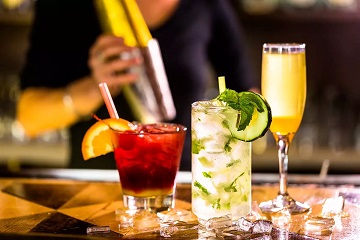
Don’t eat any later than 1 hour before consuming alcohol
Once the body begins to metabolize alcohol, undigested macronutrients are likely to be converted into lipids rather than used as an energy source. Also, as mentioned earlier, you are more likely to overeat due to the inhibition of the satiety hormone leptin when consuming alcohol.
Eat lean protein and veggies throughout the day
Since calories from alcohol contain no nutritional value, it is important to consume nutrient-dense food choices the day before and after alcohol consumption. Drinking alcohol can deplete electrolytes such as magnesium, potassium, and sodium, while vegetables (green, cruciferous vegetables especially) are abundant in vitamins and minerals (electrolytes are minerals).
A good, balanced diet is essential to achieving your daily nutritional requirements and maintaining good overall health.
Track both food and alcohol calories
There’s nothing wrong with having a set plan as to how many drinks to consume before the night has begun. By doing so, you can adjust your daily calorie intake to consume the number of calories you need to lose weight. It is also wise to consider and adjust the calories on the day before and after alcohol consumption.
For example, it may be easier to reduce 80 calories from Friday, Saturday, and Sunday rather than 240 calories from Friday to drink two 120-calorie glasses of wine on Friday and maintain your weekly calorie count. This will drastically make alcohol and weight loss a smoother combination.
Drink red wine
Red wine is well known for containing a powerful antioxidant called resveratrol. In one study, researchers from Arizona State University and Harvard Medical School tested the substance resveratrol on bees living under normal conditions (unstressed) due to their social nature being somewhat similar to that of humans.
The research confirmed that this compound extended the honey bee’s lifespan on average by 35.5%, and the bees consumed less sugar, their preferred source of food when given the option (1).
Another study published in the International Journal of Obesity showed that mice given high doses of resveratrol gained 40% less weight than the control group. While studies have not yet produced similarly conclusive results for human beings, there certainly might be some big benefits of resveratrol for us.
As a caveat, you would receive a greater amount of this antioxidant by eating fruits such as berries, apples, and actual grapes versus drinking red wine alone (2).
Alcohol and Weight Loss
Please note, the above is intended to benefit those who can drink alcohol moderately and responsibly. You must know your limits, and balance your alcohol if you’re looking to lose weight. If you are drinking an excessive amount of alcohol often, then it’s probably best to not drink any alcohol at all.
However, it’s never a good idea to just suddenly stop, especially if you’re suffering from addiction, in which case, it’s probably best to seek out the help of a dedicated alcohol rehab facility. Ultimately, abstaining from excessive alcohol consumption during a weight loss journey is essential. Consuming alcohol in general has many negative long-term as well as short-term health effects. However, one can still see progress toward fitness goals by consuming moderate amounts of alcohol and following the six tips I described above.
Choose spirits over beer and liqueur; use fresh/low-calorie ingredients; avoid eating anytime within the hour or during the time you’re drinking alcohol; eat lean protein along with plenty of nutrient-dense vegetables the day before and the day after consumption; track all of your calories including alcohol; and finally, if you’re going to drink, red wine is a good choice. Most people get into fitness to enjoy their lives even more than they already do, so here’s to a sustainable and happy life! To your health!
Top 10 Best Snacks for Weight Loss and Energy Gain
Eating balanced snacks between meals…
Weight Loss Detox Demystified: Do Detox Drinks Really Work?
With the holiday season still…
9 Healthy Postpartum Diet Tips for Post-Pregnancy Weight Loss
Having a baby and becoming…
How to Achieve a Plant Based Diet Weight Loss 2024
Trying to get in shape,…
- How to Achieve a Plant Based Diet Weight Loss 2024
- 9 Healthy Postpartum Diet Tips for Post-Pregnancy Weight Loss
- Top 10 Best Snacks for Weight Loss and Energy Gain
- Weight Loss Detox Demystified: Do Detox Drinks Really Work?
Can I still drink alcohol and lose weight?
Of course! Drinking does not automatically cause fat gain and a calorie deficit still matter when it comes to losing fat. To ensure that you remain in a calorie deficit, it’s going to be required to adjust your food intake based on how many calories you are drinking.
Can I lose weight without quitting alcohol?
In short, there is nothing inherently fattening about alcohol. What’s fattening is consistently eating too much food relative to your energy needs. As long as your overall diet puts you in a calorie deficit, you can drop fat without ditching alcohol.
Which alcohol is best for weight loss?
Red Wine
Light Beer
Dry Vermouth
Booze on the Rocks
Champagne
Sources
- Leander S. Bees decrease food intake and live longer when given a compound found in red wine. ASU School of Life Sciences. September 23, 2012. Available at https://asunow.asu.edu/content/bees-decrease-food-intake-live-longer-when-given-compound-found-red-wine
- Phillips R. WSU scientists turn white fat into obesity-fighting beige fat. WSU Insider. June 18, 2015. Available at https://news.wsu.edu/2015/06/18/wsu-scientists-turn-white-fat-into-obesity-fighting-beige-fat/
- Vadillo M, Ardévol A, Fernández-Larrea J, Pujadas G, Bladé C, Salvadó MJ, Arola L, Blay M. Moderate red-wine consumption partially prevents body weight gain in rats fed a hyperlipidemic diet. J Nutr Biochem. 2006 Feb;17(2):139-42. Epub 2005 Jul 28.
- Röjdmark S, Calissendorff J, Brismar K. Alcohol ingestion decreases both diurnal and nocturnal secretion of leptin in healthy individuals. Clin Endocrinol (Oxf). 2001 Nov;55(5):639-47.
- S. Dept. of HHS, National Institutes of Health, National Institute on Alcohol Abuse and Alcoholism. Alcohol Alert. Volume 72. April 2007.
- S. Department of Health and Human Services and U.S. Department of Agriculture. 2015–2020 Dietary Guidelines for Americans. 8th Edition. December 2015. Available at http://health.gov/dietaryguidelines/2015/guidelines/.
